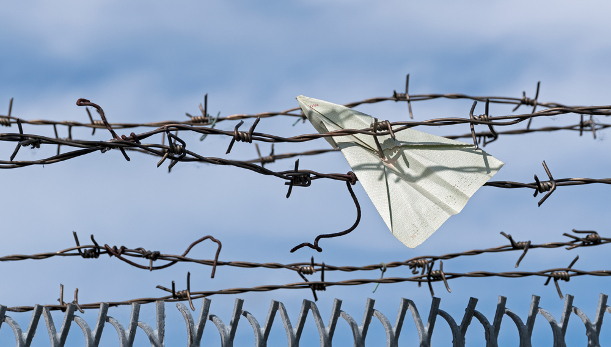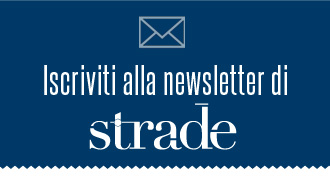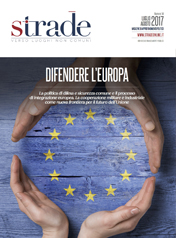Defence as a currency, a European sovereignty
Luglio/agosto 2017 / Monografica
The European Commission chaired by Jean-Claude Juncker attaches great importance to "Protecting Europe". The Commission is pushing for the creation of a Coast Guard and European Border Guard and in the field of military security has launched a European Defence Fund and an issue paper on the future of European defence. They are both opportune, even if small-scale initiatives. The logical leap to be made is to consider defence as sovereignty, a function of government, which must be transferred to the federal level. As done with the common currency.

Since its establishment three years ago, the European Commission chaired by Jean-Claude Juncker has attached great importance to security issues. “Protecting Europe” has become one of the keywords of the current Commission. This position seems to actually reflect the concerns of European citizens, as they are recorded by Eurobarometer polls.
The creation, in October 2016, at the record time of just nine months, of a Coast Guard and European Border Guard was the first response to this need for protection.
At the very same time, the European Commission has turned its attention to security in the more harsh and classic sense, namely military defence. In this case, too, the EU executive is in line with the comfort of Eurobarometer surveys, which consistently, from 2000 to present, show that between 70 and 80 percent of European citizens favour “a common security and defence policy between member States”. Passing through various intermediate stages - including closer EU-NATO cooperation enshrined in a joint declaration of June 2016 in Warsaw - the Commission has moved even further on June 7, with the launch of a European Defence Fund and the presentation of an issue document on the future of European defence system.
Which judgments should be drawn out of these developments? It all depends, of course, from the point of view. Some in Europe do not want to discuss about any Union military role – among which Great Britain, which is out of the question, but also Denmark - as it believes this is an exclusive NATO competence. Others are somewhat lukewarm – such as the countries of the former Warsaw Pact - because they are afraid of a weakening NATO, and finally some are tepid simply because they are neutral – Austria, Cyprus, Finland, Ireland, Malta, Sweden. The core of the six founding countries, including Italy, is the most sincerely convinced that security and defence are, together with economic issues, the privileged ground for advancing European integration.
If, as who is writing belongs to the latter group – with federalist aspirations – the judgment to take on the initiatives taken so far by the European Commission is, however, very modest.
The European Coastal and Coastal Guard is a small contingent of men and means that can helps out the corresponding national forces of member states “meeting their demands”. It is, in other words, a small compromise, that might never be tested. We could do a lot more, by giving the Union total control over the external borders – for controls of goods and people – without even having to change the treaty, but we prefer not to.
The European Defence Fund aims to stimulate military research and development projects carried out by companies from different Member States. That is, assuming that the appropriations from the Community budget are capable of putting in place multiple volumes of investment out of the budgets of the Member States. From 2020, the Commission thinks that by committing €1.5 billion a year will induce Member States to invest more 4 times as much. It may turn out to be mere wishful thinking, judging at least from what happened with a similar idea, the so-called European Investment Fund, otherwise called Juncker Plan.
Finally, the document reflecting on the future of European defence. This is the minor son of the White Paper on the Future of Europe, presented last March. In both cases, the technique of options (or scenarios) has been used; they consist in presenting any odd number such that the reader's choice falls on the apparently more reasonable one: the median. With this logic, we even more stick to the concept of “common defence” (the scenario number three) to remain within the "shared defence" (the scenario number two).
Those seem vague “bigger commitments” on a voluntary basis, with no new institutional framework. Not very encouraging. Especially because, only in the last twelve months, things have come to a certain extent. Great Britain has decided to leave the European Union. Americans have elected a president, Donald Trump, for whom NATO does not seem to be a priority. Up to the point that Christya Freeland, Canada's Foreign Minister - the other North American Atlantic Alliance –had to say that "relying only on the US security umbrella would make us a customer state ... and such a dependency would not be in our interest". Up to the point that German Chancellor Angela Merkel said, “the time we could fully count on the others has passed” and that “Europeans must take their own destiny in their own hands”.
The European Union can certainly have its own stand-alone defence if it wishes so. We are talking, even without the British, of the world's largest economy, which counts among the wealthiest countries, and which has among its states a permanent member of the Security Council as well as nuclear power, France. And autonomy does not mean competition. On the contrary, NATO would only gain in efficiency and operational capabilities if at least some of the European countries were an integrated European military force and e pluribus unum is an approach that Americans should first sign up.
The fact that it is not necessary to work all together is part of the concept of Europe which has been sponsored for some time by the German Government, as well as the possibility provided for in the current treaty to have “permanent structured cooperation” among Member States in the field of defence that fancy it. Lastly, it is about to change the treaties – completely independent of the opportunity now wasted – to take full advantage of the existing possibilities of approaching “a protecting Europe” both in the field of border control and in the field of defence.
In short, there are all the conditions because a large group of member states points to something more ambitious than a “shared defence”. In particular, if the treaty had to be reopened, then the logical leap forward – seventy-two years after the end of World War II, with British and American disengaging from Europe – is to consider defence as a sovereignty, a function of Government, to be transferred at federal level, as it was done with the currency. As the creation of the European Central Bank did not lead to the disappearance of national central banks, the creation of European armed forces should not lead to the disappearance of national armies, which could continue to exist on a smaller scale with territorial defence tasks or as Second lines, similarly to the US National Guard.
So let’s return to an essential element of the military (and diplomatic) Union proposal that was part of the Bonino List platform in the 1999 European elections. That is, the idea of creating a European army an explicit objective to pursue in a defined institutional framework and through a series of intermediate steps.
So it was done in time with the euro. It all started with a committee of twelve central bankers and three independent experts, chaired by then-European Commission President Jacques Delors, who presented a three-stage Monetary Union plan approved by the Madrid European Council in June 1989. The final goal and phases were incorporated into the Maastricht Treaty two years later. The institutional framework was provided by the European Monetary Institute (EMI), the forerunner of the ECB. But this procedure used to assert that a final goal was set and that it was to be achieved by successive steps, whose passages from one to the other were nevertheless under the control of governments.
So it is time for the governments of the Union and the Commission to state, contrary to what they do today, that the ultimate goal is the creation of a European army. But since no one knows today what form this army should take (how many and what means and how many officials for each armed force, what missions, what doctrines, etc.), then mandate the relevant institutions to go to work to define it by providing at the same time a last date and intermediate steps. Unlike the EMI, which had to be created from scratch, these institutions, such as the Military Committee and the European Defence Agency, already exist. This is a noteworthy an advantage.
The recipe to do something in Europe has always passed for the following three subjects: a commitment to a clear final goal, however far in the future; the sense of direction able to guide successive generations of politicians and bureaucrats; an institutional framework suited to the pursuit of that objective. So it was done with the common currency. So it must be done today, with the defence.
INDICE Luglio/agosto 2017
Editoriale
Monografica
- La difesa come la moneta, una sovranità europea
- What defence for what Europe?
- Europa, è il momento di unire le forze
- Space policies, economic internationalization and EU integration
- Un esercito comune e comunitario. L’europeizzazione possibile a trattati vigenti
- A United Europe for Defence? Increased safety and lower costs
- Quale difesa per quale Europa?
- Investing in security: the European Fund for Defence
- Le politiche spaziali, l’internazionalizzazione e l’integrazione dell’Ue
- Europa della difesa? Costa meno e ci rende più sicuri
- Investire in sicurezza: il fondo Ue per la difesa
- Common defence and security, the return of politics
- Defence as a currency, a European sovereignty
- Europe, time to unite forces
- Difesa e sicurezza comune, la rivincita della politica
- A possible EU army under current treaties









